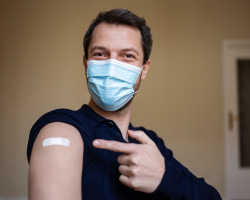
March 20, 2023—Nearly 1 in 3 Americans will develop shingles, a neurological disorder that causes painful skin symptoms. Shingles isn't just unpleasant. For some, it causes long-term pain or other complications. Luckily, there's an effective vaccine.
Why is shingles so common? It's caused by the varicella zoster virus, the same virus that causes chickenpox. And according to the Centers for Disease Control and Prevention, 99.5% of Americans born before 1980 have had chickenpox—even if they don't remember getting it.
That virus never really goes away. It stays hidden in a dormant state in your nerve cells, where it can reactivate years later as shingles. People who were vaccinated for chickenpox can get shingles, too, although the risk is lower.
CDC recommends that all adults ages 50 and older get the two-dose shingles vaccine. People over age 19 with weakened immune systems should also get the vaccine, even if they’ve been vaccinated for chickenpox.
If you're eligible for a shingles vaccine, here are five reasons to roll up your sleeve:
1. Shingles causes an itchy, painful rash. Most people with shingles develop a painful and itchy rash of blisters in a band or stripe on one side of the body or face. It can also cause fatigue, fever or headache. Pain and itching from shingles range from mild to severe. The rash usually heals in two to four weeks. But some people experience complications that last longer.
2. Shingles can cause chronic pain. According to CDC, about 10% to 18% of people who develop shingles go on to experience postherpetic neuralgia—shingles pain that lasts more than three months after the rash first appeared. The condition is more common among older adults, and it can cause mild or severe pain, as well as tingling sensations, a feeling of coldness or loss of sensation. Postherpetic neuralgia may get better over time.
3. Shingles can lead to serious complications. It's rare to die from shingles. But rashes on the face can lead to vision loss, hearing problems and trouble with balance. In rare cases, the virus can spread to the brain or spinal cord and cause complications such as stroke or meningitis.
4. You can get shingles more than once. Even if you've already had shingles, the vaccine can help prevent a flare-up. Ask your doctor how long to wait to get the vaccine after shingles symptoms clear up.
5. The shingles vaccine is more than 90% effective. And studies show it's safe. Side effects, such as a sore arm, tiredness, headache, fever, stomach pain or nausea, go away on their own after two or three days. If you're considering the vaccine, talk to your doctor. They can help you weigh the risks and benefits.
Don’t forget: Shingles isn't the only vaccine adults need. Your doctor can help you stay up-to-date—and give you the best shot at staying healthy.
Sources
- Centers for Disease Control and Prevention. "Clinical Overview." https://www.cdc.gov/shingles/hcp/clinical-overview.html.
- Centers for Disease Control and Prevention. “Shingles Burden and Trends.” https://www.cdc.gov/shingles/surveillance.html.
- Centers for Disease Control and Prevention. “Shingles Vaccination.” https://www.cdc.gov/vaccines/vpd/shingles/public/shingrix/index.html.
- National Institute of Neurological Disorders and Stroke. “Shingles.” https://www.ninds.nih.gov/health-information/disorders/shingles.